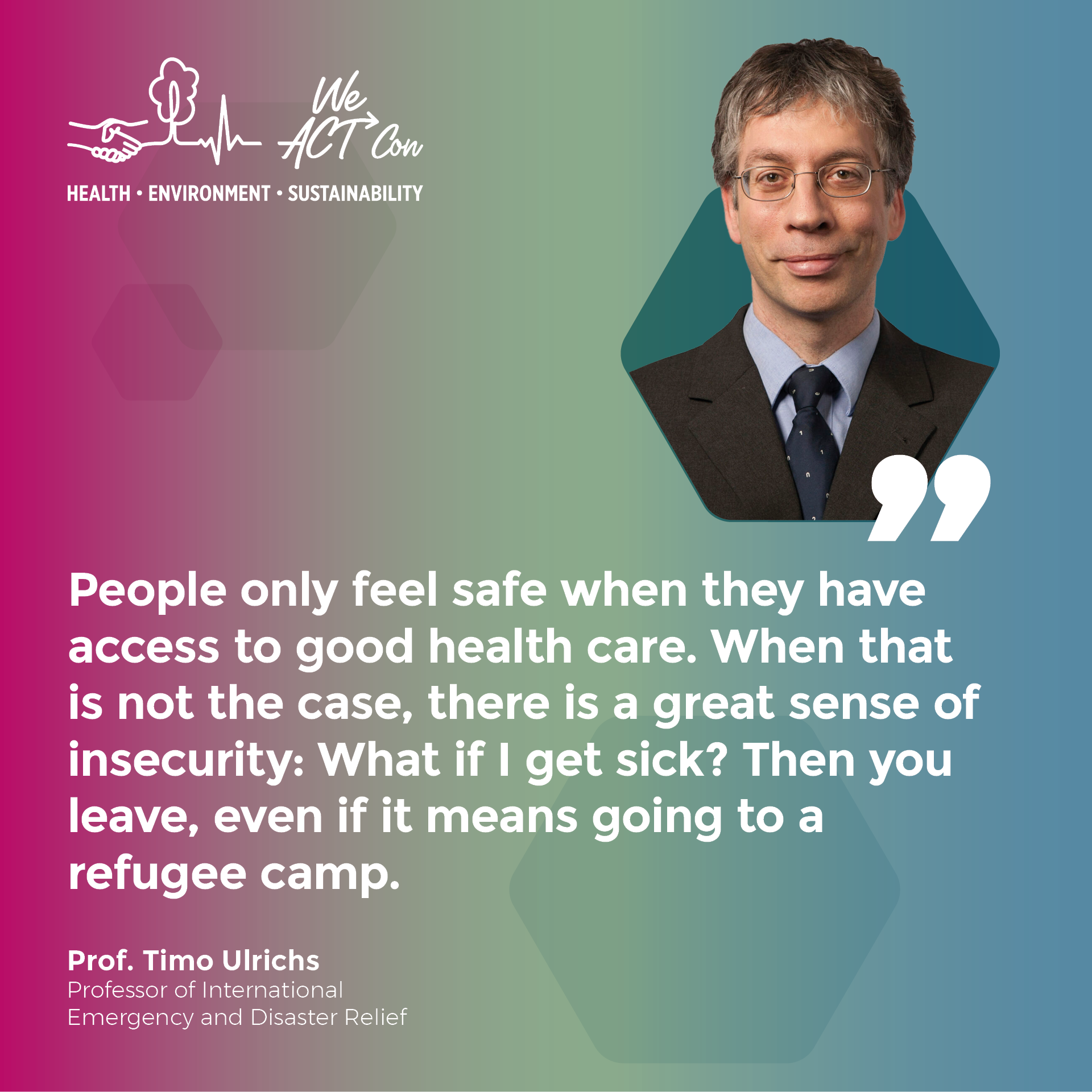
Timo Ulrichs on illness as a cause of flight
"Fear of illness is a reason to flee"
The consequences of the climate crisis are forcing more and more people to flee their homes. Timo Ulrichs, Professor of International Emergency and Disaster Relief in Berlin, says that a functioning healthcare system in the countries of origin is crucial if they are to be able to stay.
Interview by Tilman Eicke
1
Timo Ulrichs, are there blind spots when it comes to refugees and the climate crisis?
Timo Ulrichs: Most people are aware that floods, storms and other natural disasters repeatedly cause people to flee their homes. We also know that rising sea levels are causing entire island groups to disappear. What we are less aware of, however, are the medium-term consequences of the climate crisis. For example, in eastern Africa, where it has not rained for many years. Semi-nomadic or nomadic groups are losing their livelihoods as a result.
2
This is a catastrophe for those affected. As an expert in disaster relief, how do you deal with this?
In development cooperation, painful questions must now be asked. For example, whether it makes sense at all to invest in an area that will no longer be habitable in the long term. Or whether it would not be better to support migration and create a livelihood elsewhere.
3
Those who no longer have a livelihood leave their homeland.
Providing for people fleeing drought or war has always been a challenge. This has been exacerbated by the climate crisis. One example is the Dadaab refugee camp in northern Kenya. People have been living there for over 30 years, which is why we are talking about a chronification of the camp, which was actually set up as part of acute humanitarian aid. How do you provide for these people who live in an area where there are not enough resources - especially drinking water? We have to give people a perspective somewhere else. It is unacceptable for people to be pushed back and forth and never given the opportunity to build a life for themselves.
4
You are also a specialist in medical microbiology. How are health and flight connected?
People only feel safe if they receive good healthcare. As soon as this is no longer the case, a great deal of uncertainty arises: what if I fall ill? What happens if a family member gets injured? Then you set off - even if it's to a refugee camp. Fear of illness is also a reason to flee.
This situation is further complicated by the climate crisis. Pathogens are spreading to previously unaffected regions (e.g. malaria pathogens or the Ebola virus), and there are areas where people can no longer cope in summer. At the same time, droughts are destroying entire harvests and people can no longer eat a healthy diet.
5
What can Germany learn from warmer countries? Heat is also an increasingly important issue here.
That's true. You can look at the mortality rate in Germany throughout the year and you will always find small spikes in the summer months, i.e. excess mortality - and always when we have had a major heatwave.
In South Africa, we have just initiated a new cooperation project that focuses on the question of how we can deal with the consequences of climate change. South Africa extends partly into the subtropical climate zone. This means that the people there are more accustomed to heatwaves. Two things are crucial: sufficient shade and drinking water. Here we can learn from South Africa - because our cities in Germany still offer too little shade. We should also increase the availability of free drinking water.
6
The Bundestag is expected to be re-elected on February 23. What do you want from the future government?
For me, sensible development policy means that we don't just give money out of self-interest, for example because we want to limit immigration. What we need are good projects to mitigate the consequences of the climate crisis in the regions most affected. After all, we in Europe have contributed the most to the current situation through decades of fossil fuel consumption. The next German government must not cut funding for development cooperation under any circumstances.
Prof. Timo Ulrichs studied medicine in Marburg and Berlin. In Berlin, Ulrichs worked at the Max Planck Institute for Infection Biology on immunological questions relating to tuberculosis. He continued this work as a postdoc in Boston and New York. Back in Berlin, Timo Ulrichs worked simultaneously at the Max Planck Institute and at the Charité, where he completed his specialist training as a microbiologist and infection epidemiologist. From 2006 to 2021, Mr. Ulrichs worked as a consultant at the Federal Ministry of Health. At the same time, he completed his doctorate in public health at the Faculty of Health Sciences at Bielefeld University. Timo Ulrichs has headed the International Emergency and Disaster Relief course since 2012. In 2018, he founded the Institute for Research in International Assistance (IRIA) at Akkon University.

